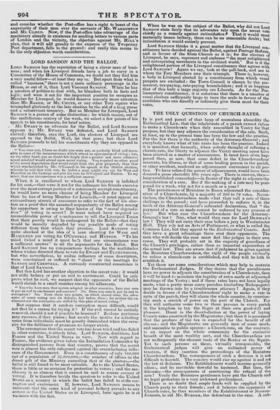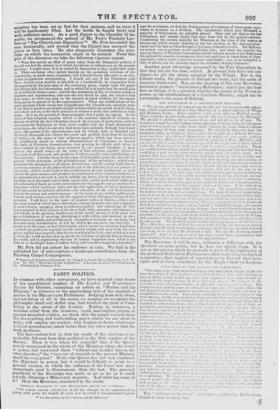THE UGLY QUESTION OF CHURCH-RATES.
IT is part and parcel of that heap of anomalous absurdity the Ecclesiastical Law, that the inhabitants of a parish cannot refuse to make a Church-rate when duly assembled in Vestry for that purpose, but they may adjourn the consideration of the rate. Such, at least, up to the present time has been the law and the practice. For the law there is the authority of the Attorney-General ; and everybody knows what of late years has been the practice. Indeed it is manifest, that formerly, when nobody thought of refusing a church-rate, the liberty to adjourn the.Vestry meeting must have been allowed as a matter of convenience. It must have often hap- pened then, as now, that some defect in the Churchwardens accounts, his illness, or that of some leading person in the parish, or other accident, rendered an adjournment convenient to all par- ties. To have refused the power of adjournment, would have been deemed a gross absurdity fifty years ago. There is custom, then— long-established consuetudo—in favour of the right to adjourn the consideration of a rate. But if the making of a rate may be post- poned for a week, why not for a month or a year?
The parishioners of Braintree in Essex adjourned the consider- ation of a Church-rate, by a majority of 209 to 70 votes. Never- theless, the Churchwardens made what they call a rate of three shillings in the pound ; and have proceeded to enforce it, in the teeth of the Attorney-General's reiterated declaration, that " the payment of a rate so made cannot be enforced by any process of law." But what care the Churchwardens for the Attorney- General's law ? Nay, what would they care for Lord DENMAN'S law ? They will not carry their case before a jury in Westminster Hall. They rely not on Acts of Parliament, or what is called the Common Law, but they appeal to the Ecclesiastical Courts. And they have a great advantage there over their opponents. The men who will decide the case must feel like judges in their own cause. They will probably act in the capacity of guardians of the Church's privileges, rather than as impartial expounders of the actual law. They are aware that if judgment be given against the Braintree Churchwardens, the right of the people virtually to refuse a church-rate is established, and they will be loth to establish it.
Yet there are some considerations which may help to restrain the Ecclesiastical Judges. If they decree that the parishioners have no power to adjourn the consideration of a Church-rate, then it will be hard to maintain the legality of rates made at adjourned meetings of the Vestry ; and if these rates have not been legally made, what a pretty mess many parishes (including Bishopsgale) may be thrown into by a troublesome attorney ! Again, if they decide in favour of the Churchwardens' right to make a rate in spite of the parish, they will alarm the whole country, by sanction- ing such a stretch of power on the part of the Church. For
they will authorize some two or three persons in every parish in the kingdom to tax the lieges at their own good-will and pleasure. Great is the dissatisfaction at the power of laying Cuunty-rates exercised by the Magistrates ; but then it is presumed that the produce of the tax is expended for the benefit of all classes ; and the Magistrates are generally men of some mark, and amenable to public opinion : a Church-rate, on the contrary, is an impost on the whole community for the exclusive benefit of the most wealthy sect, and the Churchwardens are not unfrequently the obscure tools of the Rector or the Squire. Yet to such persons as these, virtually irresponsible, the Ecclesiastical judges will give an unlimited power of taxation, if they sanction the proceedings of the Braintree Churchwardens. The consequences of such a decision it is not difficult to foretell. The country would rise up against it and set the law at defiance. The Establishment would become generally odious, and its inevitable downfal be hastened. But then, the
dilemma—the consequences of sanctioning the refusal of the rate ! Verily the Braintree gentlemen have put the Church and its legal protectors in a very awkward predicament.
There is no doubt that ample funds will be supplied by the Church party to their friends ; and it behoves the opponents of Church-rates, be they members of the Establishment or Noncon- formists, to aid Mr. Buenas, the defendant in the case. A sub-
scription has been set on foot for that purpose, and we trust it will be handsomely filled. Let the battle be fought fairly and with sufficient means. As a good flapper to the liberality of the public, we recommend the perusal of Mr. Fox's Finsbury Lec- ture on "The Church-rate Imposition."* Mr. Fox has stated the case historically, and proved that the Church has usurped the power to levy rates. He also eloquently illustrates the prin- ciple on which the usurpation ought to be resisted. From this part of the discourse we take the following vigorous appeal. sr Were this merely an affair of pence taken from the Dissenters' pockets, I should not feel the interest in it which has led me to address you on the present occasion: I might leave it to be settled by themselves as they might best settle it. There are many other points bearing on the pecuniary relations of the community, so much more important, that I should throw this aside as an alto- gether insignificant consideration. I should not care if the Dissenters paid these church-rates, tenfold, or fiftyfold, or a hundredfold, in comparison with the payment by the poor man of the remaining penny impost upon the paper that brings him his information, and in which he is to learn how the world goes on of which he forms apart; orwhile the necessaries of life, or its most common comforts and conveniences, and even the very bread he eats, are taxed to that poor man ; or while any man in the country is taxed without his free assent being given in person or by his representative. These are modifications of the main question which sweep into insignificance the Church-rate question, were it not that it involves principles as high as those which are mixed up with them, and which call on us for their assertion in whatever mode that assertion is to be made. It is on the ground of those principles that I make my appeal. In the name of that religious equality which is the essential element of religion—in defence of which the first Christians braved the horrors of martyrdom—which stimulated the Reformers in their great conflict with the Papal despotism of other days—for which in our own land many have endured, through lengthened years, the agonies of the prison-house—and for which, both in England and Scotland, thousands have drawn the sword and perilled their lives on the field of battle,—in the name of that religious equality which has been asserted by enlightened minds in various demonstrations of Christians, or beyond the limit of Christian denominations, ever proving its affinity with what is most exalted in our being, most energetic in our mental faculties, or most pure in our moral state,—in the name of that religious equality which is the germ of all this good and goodness, I call on yuu for your contributions on this occasion. I invoke them in the name of that public good, the ideal of the patriot, of the statesman, of the philanthropist, of the speculatist ; which con- templates the abrogation of all odious distinctions, and the calling forth the co- operating energies of all orders of mind, and of the different physical powers of humanity—which would lead to the establishment of such institutions as shall elevate the great masses, and produce an equalization of the human condition, or an approximation towards it, not by pulling any down, but by raising whatever has been most depressed and trodden upon—that public good which tithes and all ecclesiastical funds arc noble endowments fur the support and promotion of— a treasure which legitimate right and the wise application of future legislators shall consecrate to national education—the education of all, and their instruc- tion in the purest and noblest manner : in the name, I say, of that public good, I invite your zealous exertions for the support of those who appeal to you on this occasion. I call for it in the name of popular right—of liberty,—that word, the niece sound of which has so often been a charm in men's ears, and a stimulus in men's hearts, engaging them in enduring conflict, and embodying all they had conceived in their dreams of the most high, lofts', generous, :mil expansive; and which, as the growing intelligence of the world invests it with more and more definiteness of meaning, identifying it with utility, and showing its pro- ductiveness of public and private good, strengthens its claim on our souls, and demands every manifestation of zeal by which we can prove our sincerity. I invoke it in the name of that Christianity which knows no sectarian distinction —which recognizes no imposed creeds—which invites each man to be his own priest, and his own heart the altar for the worship of his God—and which was sent to bless the world not less than to glorify its Creator—to glorify Him in blessing the world, and in augmenting the sum of human happiness here, while it un- folds to us the bright hope of endless being and boundless happiness hereafter."
Mr. Fox did not exhort his audience in vain. We find in the published list of subscriptions a handsome contribution from the Finsbury Chapel Congregation.
• Reports of Lectures delivered at the Chapel in South Place, Finsbury, by 7. W, Fox. No. VII. " The Chunclorate Imposition." A Lecture iu aid of the sithseription. &c. Published by CHARLEs Fox.



























 Previous page
Previous page